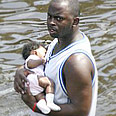America is crying, America is ashamed, but most of all – America is infuriated.
A huge wave of fury directed at the Administration, whose branches failed to function properly, is rising through American public opinion, much like a public, social, and political tsunami.
Sever Plocker is newspaper Yedioth Ahronoth's business editor and a regular commentator on political and economic affairsInfuriated over the failed rescue and assistance efforts extended to victims of hurricane Katrina, infuriated over the complete collapse of public order in wide areas of New Orleans, and infuriated over skyrocketing fuel prices.
America is also angry with rescue services that left thousands to die, and angry with President Bush, who during a national crisis continued vacationing and muttering cliches.
Katrina Hits
Yitzhak Benhorin
Prime Minister Sharon sends condolence letter to U.S. President Bush, offers to help relief effort; some Arab countries say disaster divine retribution for American policy
CNN took upon itself the role of reporter from the hell that is the devastated New Orleans. The network did not spare resources to bring the images of horror and devastation, as well as both physical and human chaos, to every home in America.
The reporters report, and the photographers photograph images of death and desperation on a scale America has never known before – bodies floating in streets that turned into rivers, masses of hungry residents storming stores, hospitals who ran out of medicine, doctors collapsing under the strain, empty food warehouses, mountains of filth, dismantled buses going nowhere, daylight robberies and rapes.
On top of that, America sees thousands of its elderly crowded on benches in a leaking stadium, sharpshooters firing from rooftops, hurt children looking, in vain, for their parents, and parents looking in vain for their children, while National Guard troops with full military gear patrol the streets as if they are the alleyways of Baghdad, amidst the hopelessness visible in survivors' eyes.
About a million and a half to two million Louisiana and Mississippi residents lost overnight their homes, belongings, businesses, work places, bank accounts, and some even their loved ones and friends.
Disaster refugees have hit the roads, looking for states and districts in the U.S. that would provide them with some shelter, medicine, and food.
The Wall Street Journal, a business paper not known for being overly sentimental, is publishing special editions and calling on the entire business community to offer aid. Former American presidents join forces and ask their country people to open their checkbooks, and mostly their hearts, to help the victims.
Is America on way to recession?
In economic terms, Katrina's direct damages are estimated to have hit at least USD 50 billion. Industrial plants, casinos, refineries, whole city districts, resorts, ports, train stations, power stations, shopping malls, and municipal infrastructure have all been destroyed.
The states most badly hit, Mississippi and Louisiana, only produce two percent of America's GDP, but both produce about 25 percent of American's oil and natural gas.
Now, as a result of the hurricane, their output has almost hit zero. In the Western U.S. there are some gas stations that sell fuel at prices that are almost equivalent to Israeli rates – double the price they charges last year.
The U.S. Congress has already approved an initial emergency budget of USD 10 billion. More funds are certain to follow. At the end of the day, the money will be found – after all, America is a very wealthy country, but the money would not solve everything.
If demand for fuel does not decrease, the market price of one barrel of the so-called black gold could reach USD 90 and not go down again until winter's end. Under such pessimistic scenario, a deep recession (to the point of complete end to growth) could hit the American economy.
In the wake of the September 11 attacks, Americans felt a deep sense of national pride over their solidarity and restraint, efficient response to the disaster. Now, they feel horror and anger.
Horror, as a result of the rapidity in which a modern American city in the 21st century degenerated into a rubble-strewn battlefield. Anger, as a result of the shameful failure of all rescue forces, law enforcement agencies, and government arms.
The Katrina aftershock hurt the conscience of every American and deeply dented America's self-image as a dedicated, united nation able to offer quick response in difficult situations.
In this regard, the Katrina failure is similar to our own Yom Kippur War failure, where a surprising Arab attack in 1973 caught us completely off guard, exacting a heavy human toll.
The political ramifications of the failure in America may be similar to what happened here following that war. The ruins of New Orleans may give rise to a popular protest movement that would gradually amass power and influence, paralyzing the Bush Administration and leading to a stinging Republican defeat in the upcoming (partial) elections for Congress.
Indeed, the Katrina disaster's echo may have only started to resonate.

















